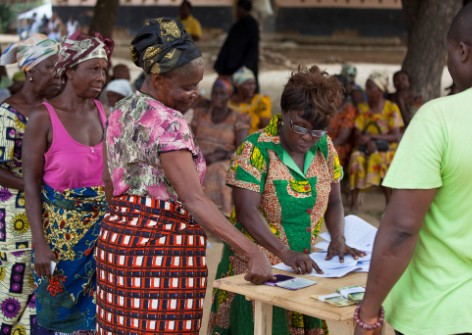Women empowerment is force against hunger and poverty
 Empowering rural women with resources and equipping them with skills for services and decent jobs is a driving force in the fight against poverty and hunger.
Empowering rural women with resources and equipping them with skills for services and decent jobs is a driving force in the fight against poverty and hunger.
Mr Serge Nakouzi, Deputy Representative of the Food and Agriculture Organisation (FAO) for the Africa Region, has therefore advocated a massive investment in rural women, saying “it is a low hanging fruit for raising agricultural productivity, eradicating hunger and malnutrition and reducing rural poverty towards the achievement of the Sustainable Development Goals”.
At the opening of a three-day Gender and Agenda 2063 Consultative Meeting with Rural Women, being held in Accra, Ghana, Mr Nakouzi said rural women were central to the FAO’s mandate to achieve food security for all.
Mr Nakouzi said there was a fruitful partnership between the FAO and the African Union Commission in promoting gender equality and women empowerment in other areas.
He said: “This consultative meeting with rural women on gender and Agenda 2063 exemplifies the unique and very special relationship between the African Union Commission and the FAO in serving rural women who feed Africa.
“We have joined our forces to create this space of dialogue so that rural women and their organizations and network their needs and priorities within the framework of new gender strategy of the African Union.
He said the FAO’s policy on gender equality adopted in 2012 aimed at advancing the equality of voice, agency and access to resources and service between woman and men in sustainable production and rural development.
Dr Bernadette Lahai, Vice President of the Pan African Parliament said efforts to achieve equality of access by women and men to goods and services for agricultural development has reduced women’s work burden by 20 per cent through technologies.
She underlined the need for women to participate equally with men as decision makers in rural institutions in shaping laws, policies and programmes; women and men have equal access to and control over decent employment and land and other productive resources.
“This Consultative meeting would have largely achieved its expected outcomes of collective ownership of the new strategy; harmonization of existing gender equality and women’s empowerment strategies of the AUC and other AU organs; monitoring and tracking tools to assess progress of implementation on an annual basis developed, detailed action plan generated for implementation; and capacity required to successfully implement the new strategy as well as backstopping and support required by the various stakeholders and the AUC for implementation identified, Dr Lahai said.
Mrs Gifty Twum-Ampofo, Deputy Minister for Gender, Children and Social Protection, urged stakeholders in the empowerment of women to enhance the role of women in agriculture and development by addressing issues of maternal health, land tenure and credit facilities.
She said it was necessary women were made to go beyond the micro levels and given bigger roles in agriculture and development.
The Consultative Meeting would define priority intervention areas for the Africa Union (AU) in empowering rural women in food security and nutrition, agri-food systems and value chain and management of natural resources in the context of climate change.
Adopted in January 2015, by the Africa Union, Agenda 2063 is both a Vision and an Action Plan, which call for action to all segments of African society to work together to build a prosperous and united Africa based on shared values and a common destiny within the next 50 years.
At their 50th Anniversary Solemn Declaration, the Heads of State and Government of the AU, while acknowledging past successes and challenges, rededicated themselves to the continent’s accelerated development and technological progress.
They laid down vision and ideals in the Agenda to serve as pillars for the continent in the foreseeable future, which would be translated into concrete objectives, milestones, goals, targets and actions/measures.
Participants to the consultative meeting includes rural women and their organizations and networks, and key participants from Organs, RECs, Member States, civil society, Private Sector, academia and research institutions and media.
Source: GNA
